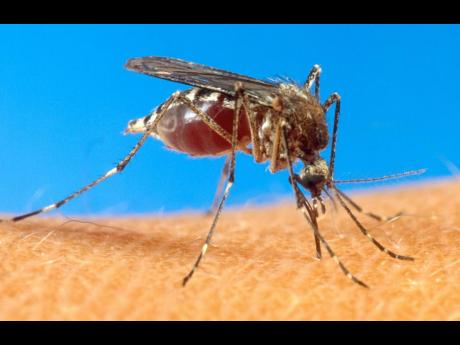(Jamaica Gleaner) With some 565 suspected, presumed and confirmed cases as of Friday, the Ministry of Health and Wellness yesterday declared an outbreak of dengue in Jamaica.
The outbreak comes as the ministry’s National Surveillance Unit advised that Jamaica has surpassed the dengue epidemic threshold for July and August and is on a trajectory to do the same for the month of September. This means, the country has seen an increase in the number of cases compared to what is normally seen during these months of the year.
So far there have been 78 confirmed cases, with the majority in Kingston and St Andrew, St Catherine and St Thomas. The dominant strain is Dengue Type 2, which last predominated in 2010.
There are no dengue-related deaths classified at this time; however, six deaths are being investigated, the health ministry said.
Dengue fever is a mosquito-borne disease that is usually a mild illness in which a person may get a fever, headache, joint, and muscle pains. It is usually treated with acetaminophen/paracetamol for the fever, with rest and proper hydration recommended. Persons presenting with worsening symptoms are advised to seek immediate medical attention.
According to the health ministry, persons are not to use aspirin, diclofenac, ibuprofen, or any of the medications/pain relievers known as non-steroidal anti-inflammatory drugs (NSAIDs). These drugs, when used to treat the fever in dengue, have been known to increase the severity of the disease.
Chief Medical Officer Dr Jacquiline Bisasor McKenzie is cautioning that “on occasions the illness can progress to severe dengue, which can result in organ failure as well as bleeding (haemorrhage), and severe fluid depletion that can lead to shock and death”.
“Persons experiencing fever, vomiting, severe abdominal pain, bleeding under the skin (petechial rash), feeling very weak, or getting confused, are to seek immediate medical attention,” Bisasor McKenzie noted.
In an attempt to mitigate the impact, the health ministry said it has deployed approximately 500 temporary vector control workers across the island to high-risk communities, along with 213 permanent workers. An additional 600 temporary workers will now be engaged to increase the search and destroy of mosquito breeding sites as well as health education activities.
“The ministry and the regional health authorities have made the necessary preparations for a possible outbreak. Since 2019, the Government of Jamaica, through the Ministry of Health and Wellness, has made significant investments in the vector control programme, with over J$300 million in acquisition of vehicles, fogging machines and the expansion of the number of staff dedicated to the vector management programme,” Minister of Health and Wellness Dr Christopher Tufton said.
“The ministry, through resources from the National Health Fund, will expand the community strategies through the engagement of all stakeholders at the community level. This engagement will involve the provision of resources to undertake dengue mitigation strategies. These activities will include support for the removal of bulky waste and drain-cleaning exercises across the country.”
He added, “Since July 2023, the parish health departments have been engaged in enhanced fogging and treatment of breeding sites. This has resulted in a seven-day extended workweek for fogging and other mosquito eradication activities by the team.”
Opening hours for all Type 3-5 health centres will be extended to 8 p.m. starting Monday, October 2, to accommodate people visiting these facilities to receive treatment and referrals where necessary.
Additionally, also as of October 2, children under the age of 18 years who visit the University Hospital of the West Indies will not be charged a fee or be required to pay for services at the facility.
The National Emergency Operations Centre, as well as the emergency operations centres in all parishes, will be activated as of tomorrow. These centres will monitor and report on all facets of the outbreak with a view to minimising the cases across the island.
The health ministry is advising the public that the Aedes aegypti mosquito breeds in any containerised environment; that is, in anything that can hold water. Some of the common breeding sites for the Aedes aaegypti mosquito are drums, tyres, buckets, and animal feeding containers.
“Persons are urged to play their part in ensuring that the cases are minimised by monitoring water storage containers for mosquito breeding; keeping surroundings free of debris; destroying or treating potential mosquito breeding sites; wearing protective clothing; using a DEET-containing mosquito repellent and, as much as possible, staying indoors at dusk with windows and doors closed,” said the health ministry.






